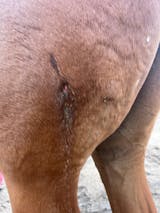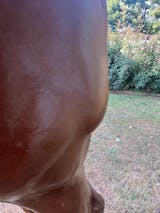Anhidrosis in Horses: Understanding “No-Sweat” Syndrome & the Truth About Beer Therapy

What Is Anhidrosis?
Anhidrosis—sometimes called “dry-coat” or “non-sweating”—is a partial or complete loss of the ability to sweat. Because horses rely on sweating for thermoregulation, non-sweating horses can overheat quickly in hot or humid weather.
Key Signs & Heat Risks
- Dry or coarse coat after exercise; sweat may appear only in small patches (e.g., under the mane).
- Elevated respiratory rate and heart rate; slow recovery after work.
- Lethargy, decreased performance, heat intolerance—especially in hot/humid environments.
Risks: Unchecked overheating may progress to heat exhaustion or heat stroke. Act early and reduce workload during heat spikes.
Proven, Conventional Care
Environment & Schedule
- Maximize shade, airflow (fans), and stall/aisle ventilation.
- Ride at cooler times (dawn/dusk); shorten or postpone work on extreme days.
Hydration & Electrolytes
- Offer cool, clean water at all times.
- Use balanced electrolytes as directed to replace sweat losses during heat.
Active Cooling
- Hose with cool water; scrape; repeat until temperature and respiration normalize.
- Use misting, fans, and shaded recovery areas post-work.
Beer Therapy: What the Evidence Says
You may hear that “beer helps non-sweaters” because of brewer’s yeast and B-vitamins. Current evidence is limited and mixed. Typical beer servings are unlikely to deliver meaningful nutrient levels for sweat function, and alcohol creates needless risk for some horses.
- If you’re considering any trial, talk to your veterinarian first.
- Prioritize proven measures: environmental control, workload adjustments, hydration/electrolytes, and aggressive cooling.
This article is educational and not a substitute for professional veterinary advice.
Cooling Protocol (Quick Checklist)
- Move to shade and airflow; remove tack.
- Hose cool water over neck, chest, and large muscle groups; scrape; repeat cycles.
- Offer cool water and rest; monitor respiration until back toward baseline.
- Resume light work only when horse recovers well; avoid peak heat windows.
ShowBarn Secret® Soothing Horse Shampoo with Lavender
Gentle, SLS-free cleansing that preserves natural oils and leaves the coat soft. Lavender’s calming scent helps make bath time more pleasant—especially useful when frequent cooling baths are part of your summer routine.
- SLS-free, balanced cleansing
- Lavender aromatics for a calmer bath
- Helps keep skin/coat comfortable during frequent rinse-downs
Anhidrosis FAQ
Is there a cure for anhidrosis?
There’s no single proven cure. Most management focuses on environment, hydration/electrolytes, work timing, and active cooling. Work with your veterinarian to tailor a plan and monitor progress.
Can horses with anhidrosis still perform?
Many can perform with adjustments—cooler schedules, reduced intensity, and strict cooling protocols. In severe heat/humidity, postponing work may be the safest choice.
Does clipping help?
Body clipping can improve evaporative cooling for heavy-coated horses in hot seasons. Combine with shade, airflow, and water cooling for best results.
Which supplements help?
Discuss electrolyte plans and any targeted nutrients with your vet. Avoid adding multiple new products at once—change one variable at a time and track results.
When should I call the vet?
Call immediately if your horse shows signs of heat illness—collapse, unsteady gait, rapid breathing that doesn’t come down, or abnormal behavior. Early intervention matters.
Related Resources
© Draw It Out® Horse Health Care Solutions. Educational content only; always consult your veterinarian for diagnosis and treatment.











